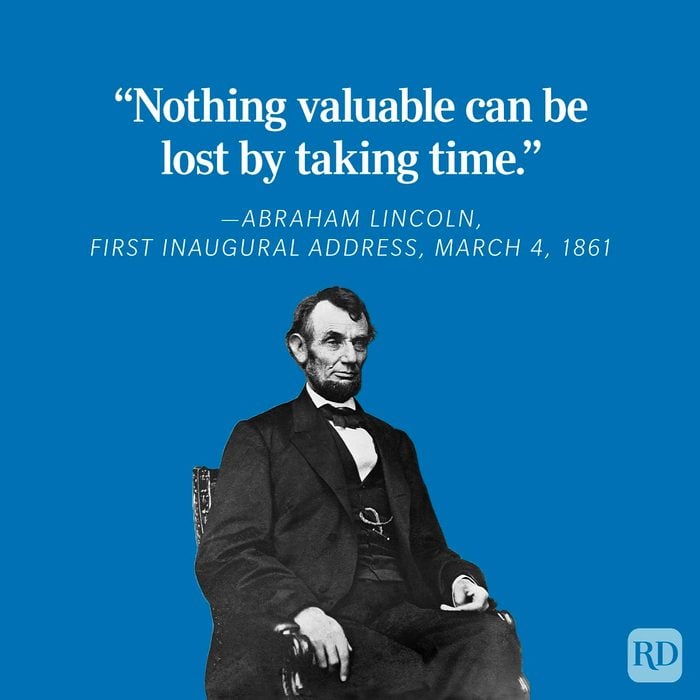
Abraham Lincoln quotes to inspire you
February is host to many federal holidays and some lesser-known observances. Among them are Presidents Day, which falls on Feb. 19, in 2024, and Abraham Lincoln’s birthday, on Feb. 12. Despite only four years of presidency—from March 1861 to April 1865— “honest Abe” was an incredibly influential leader. This means that in February, you’ll find yourselves at a crossroads of history and celebration, where you can reflect on Abraham Lincoln quotes about leadership, life and democracy.
In honor of the 16th president of the United States, take a look at the many Lincoln quotes that have served as a beacon of inspiration for generations. From his stirring address at Gettysburg to his powerful words about democracy, these quotes by Abraham Lincoln can be used as guiding lights for the present and the future.
Get Reader’s Digest’s Read Up newsletter for more famous quotes, holiday tips, fun facts, humor, cleaning, travel and tech all week long.
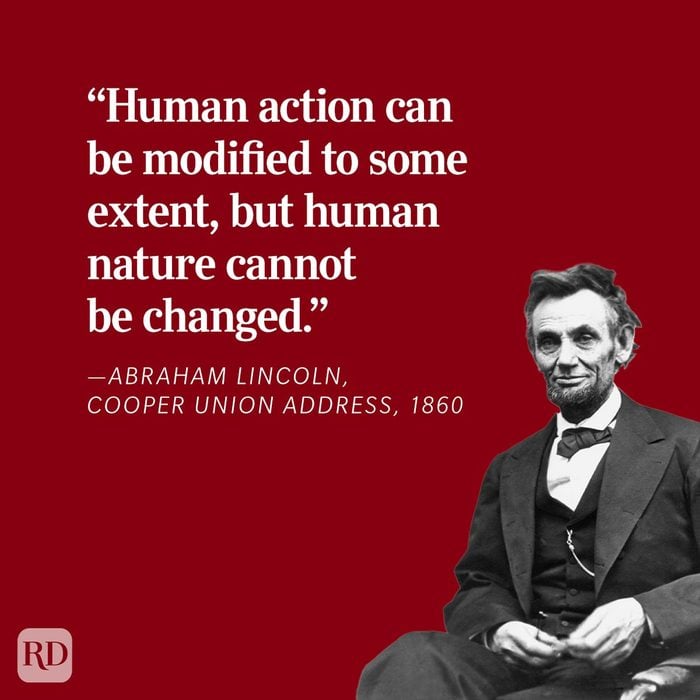
Influential Abraham Lincoln quotes
1. “Human action can be modified to some extent, but human nature cannot be changed.” —Cooper Union Address, 1860
2. “Now, as to the young men. You must not wait to be brought forward by the older men. For instance, do you suppose that I should have ever got into notice if I had waited to be hunted up and pushed forward by older men?” —Letter to William H. Herndon, July 22, 1848
3. “War at the best, is terrible, and this war of ours, in its magnitude and in its duration, is one of the most terrible.” —Speech at Philadelphia, June 16, 1864
4. “Bad promises are better broken than kept.” —Last public speech, April 11, 1865
5. “I have been driven many times upon my knees by the overwhelming conviction that I had nowhere else to go. My own wisdom and that of all about me seemed insufficient for that day.” —Conversation with Noah Brooks
6. “The dogmas of the quiet past are inadequate to the stormy present. The occasion is piled high with difficulty, and we must rise with the occasion. As our case is new, so we must think anew, and act anew. We must disenthrall ourselves, and then we shall save our country.” —Second Annual Message to Congress, December 1, 1862
7. “I wish all men to be free.” —Letter to Henry W. Hoffman, October 4, 1864
8. “I know not how to aid you, save in the assurance of one of mature age, and much severe experience, that you can not fail, if you resolutely determine, that you will not.” —Letter to George Latham, July 22, 1860
9. “In this great struggle, this form of Government and every form of human right is endangered if our enemies succeed. There is more involved in this contest than is realized by every one.” —Speech to the 164th Ohio Regiment, August 18, 1864
10. “I do not mean to say that this government is charged with the duty of redressing or preventing all the wrongs in the world; but I do think that it is charged with the duty of preventing and redressing all wrongs which are wrongs to itself.” —Speech at Cincinnati, September 17, 1859
11. “You are ambitious, which, within reasonable bounds, does good rather than harm.” —Letter to Joseph Hooker, January 26, 1863
12. “We are not enemies, but friends. We must not be enemies. Though passion may have strained, it must not break our bonds of affection. The mystic chords of memory, stretching from every battlefield and patriot grave to every living heart and hearthstone all over this broad land, will yet swell the chorus of the Union, when again touched, as surely they will be, by the better angels of our nature.” —Lincoln’s First Inaugural Address, March 4, 1861
13. “Let North and South—let all Americans—let all lovers of liberty everywhere join in the great and good work.” —Speech at Peoria, October 16, 1854
14. “On the question of liberty, as a principle, we are not what we have been. When we were the political slaves of King George, and wanted to be free, we called the maxim that ‘all men are created equal’ a self-evident truth; but now when we have grown fat, and have lost all dread of being slaves ourselves, we have become so greedy to be masters that we call the same maxim ‘a self-evident lie.'” —Letter to George Robertson, August 15, 1855
15. “If we have no friends, we have no pleasure; and if we have them, we are sure to lose them, and be doubly pained by the loss.” —Letter to Joshua F. Speed, February 25, 1862
16. “Property is the fruit of labor…property is desirable…is a positive good in the world. That some should be rich shows that others may become rich, and hence is just encouragement to industry and enterprise. Let not him who is houseless pull down the house of another; but let him labor diligently and build one for himself, thus by example assuring that his own shall be safe from violence when built.” —The Collected Works of Abraham Lincoln, Volume VII, Reply to New York Workingmen’s Democratic Republican Association, March 21, 1864
17. “Thoughtful men must feel that the fate of civilization upon this continent is involved in the issue of our contest.” —Letter to John Maclean, December 27, 1864
18. “With us every soldier is a man of character, and must be treated with more consideration than is customary in Europe.” —Letter to Count Gasparin, August 4, 1862
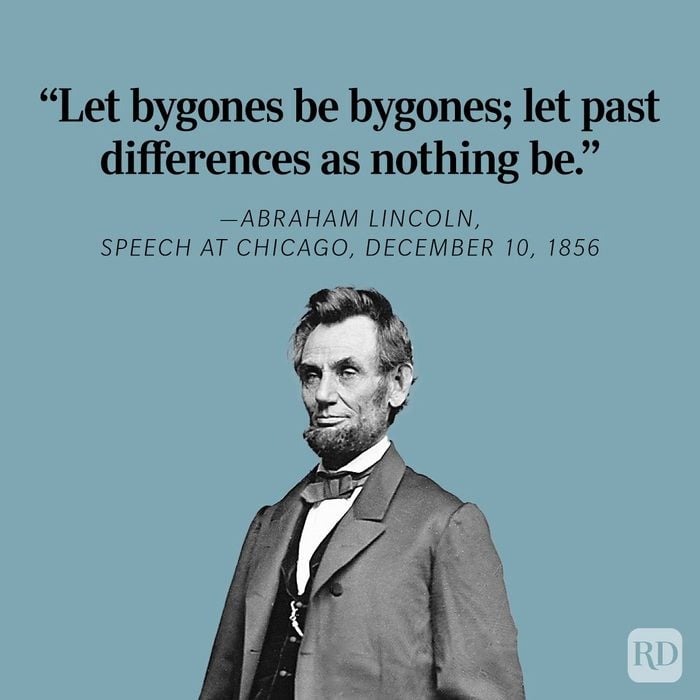
Abraham Lincoln quotes about life
19. “If you intend to go to work, there is no better place than right where you are; if you do not intend to go to work, you can not get along anywhere.” —Letter to John D. Johnson, November 4, 1851
20. “All creation is a mine, and every man a miner.” —Lecture on Discoveries, Inventions and Improvements, February 22, 1859
21. “Holding it a sound maxim that it is better only sometimes to be right than at all times to be wrong, so soon as I discover my opinions to be erroneous, I shall be ready to renounce them.” —Address to the People of Sangamon County, March 9, 1832
22. “In times like the present, men should utter nothing for which they would not willingly be responsible through time and eternity.” —Message to Congress, December 1, 1862
23. “Quarrel not at all. No man resolved to make the most of himself can spare time for personal contention. Better give your path to a dog than be bitten by him.” —Letter to J.M. Cutts, October, 26, 1863
24. “Truth is generally the best vindication against slander.” —September 1864
25. “Let bygones be bygones; let past differences as nothing be.” —Speech at Chicago, December 10, 1856
26. “And now, beware of rashness. Beware of rashness, but with energy, and sleepless vigilance, go forward, and give us victories.” —Letter to Joseph Hooker, January 26, 1863
27. “I never encourage deceit, and falsehood, especially if you have got a bad memory, is the worst enemy a fellow can have. The fact is truth is your truest friend, no matter what the circumstances are.” —Letter to George E. Pickett, 1842
28. “I have found that when one is embarrassed, usually the shortest way to get through with it is to quit talking or thinking about it, and go at something else.” —Speech at Cincinnati, September 17, 1859
29. “Happy day, when, all appetites controlled, all poisons subdued, all matter subjected, mind all conquering mind, shall live and move the monarch of the world.” —Temperance Address, February 22, 1852
30. “As labor is the common burden of our race, so the effort of some to shift their share of the burden on the shoulders of others is the greatest durable curse of the race.” —Fragment on Slavery, July 1854
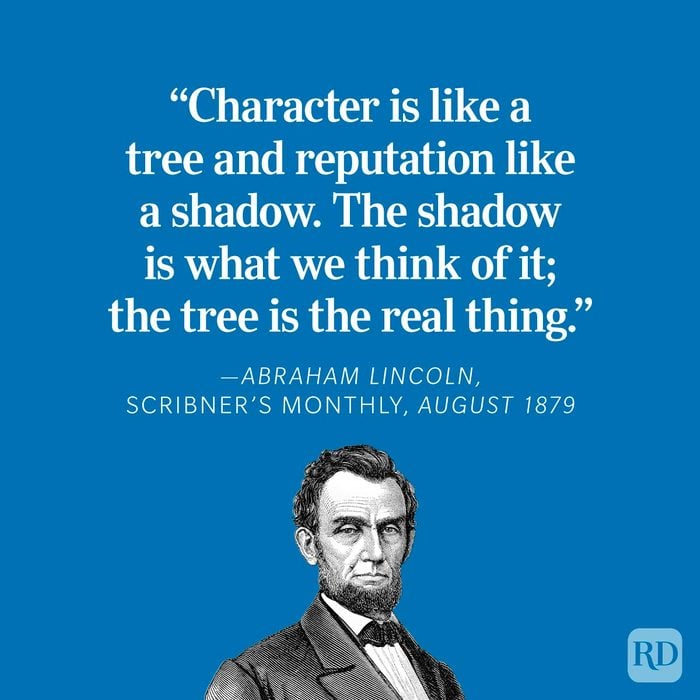
Abraham Lincoln quotes about faith
31. “Let us diligently apply the means, never doubting that a just God, in His own good time, will give us the rightful result.” —Letter to John C. Conkling, August 26, 1863
32. “The will of God prevails. In great contests each party claims to act in accordance with the will of God. Both may be, and one must be, wrong. God cannot be for and against the same thing at the same time. In the present civil war it is quite possible that God’s purpose is something different from the purpose of either party—and yet the human instrumentalities, working just as they do, are of the best adaptation to effect His purpose.” —Meditation on the Divine Will, September 2, 1862
33. “With malice toward none, with charity for all, with firmness in the right as God gives us to see the right, let us strive on to finish the work we are in; to bind up the nation’s wounds; to care for him who shall have borne the battle, and for his widow and his orphan—to do all which may achieve and cherish a just and lasting peace, among ourselves, and with all nations.” —Second Inaugural Address, March 4, 1865
34. “And having thus chosen our course, without guile, and with pure purpose, let us renew our trust in God, and go forward without fear, and with manly hearts.” —Special Message to Congress, July 4, 1861
35. “I have very earnestly urged the slave-states to adopt emancipation; and it ought to be, and is an object with me not to overthrow, or thwart what any of them may in good faith do, to that end.” —Letter to John M. Schofield, June 23, 1863
36. “In very truth he was, the noblest work of God—an honest man.” —Eulogy for Benjamin Ferguson, February 8, 1842
37. “Character is like a tree and reputation like a shadow. The shadow is what we think of it; the tree is the real thing.” —Scribner’s Monthly, August 1879
38. “I am not bound to win, but I am bound to be true. I am not bound to succeed, but I am bound to live by the light that I have. I must stand with anybody that stands right, and stand with him while he is right, and part with him when he goes wrong.” —Speech at Peoria, October 16, 1854
39. “Intelligence, patriotism, Christianity and a firm reliance on Him, who has never yet forsaken this favored land, are still competent to adjust, in the best way, all our present difficulty.” —First Inaugural Address, March 4, 1861
40. “Men are not flattered by being shown that there has been a difference of purpose between the almighty and them.” —Letter to Thurlow Weed, March 15, 1865
41. “I happen temporarily to occupy this big White House. I am living witness that any one of your children may look to come here as my father’s child has.” —Speech to One Hundred Sixty-Sixth Ohio Regiment, August 22, 1864
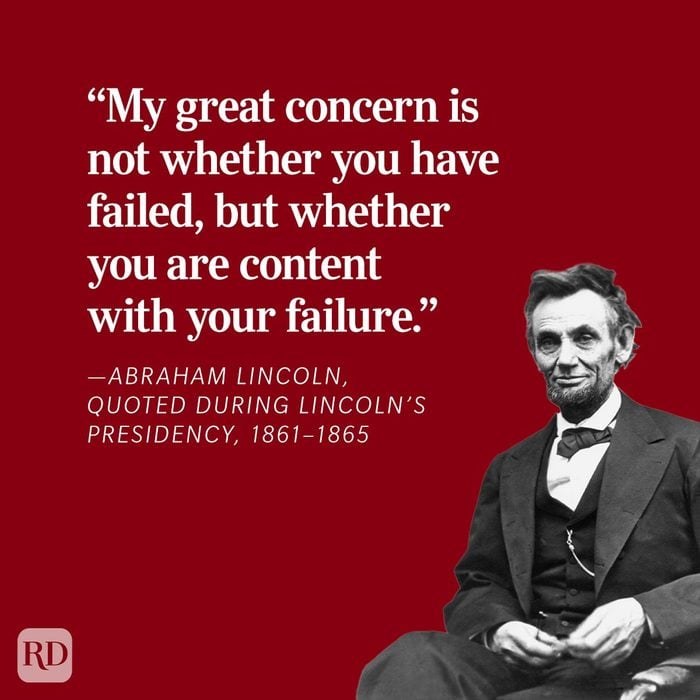
Abraham Lincoln quotes about failure and success
42. “I shall not do more than I can, and I shall do all I can to save the government, which is my sworn duty as well as my personal inclination. I shall do nothing in malice. What I deal with is too vast for malicious dealing.” —Letter to Cuthbert Bullitt, July 28, 1862
43. “My great concern is not whether you have failed, but whether you are content with your failure.” —Quoted during Lincoln’s presidency, 1861–1865
44. “A man watches his pear-tree day after day, impatient for the ripening of the fruit. Let him attempt to force the process and he may spoil both fruit and tree. But let him patiently wait, and the ripe pear at the length falls into his lap.” —Remarks at White House, February 1865
45. “If a man will stand up and assert, and repeat and re-assert, that two and two do not make four, I know nothing in the power of argument that can stop him.” —Speech at Peoria, October 16, 1854
46. “If a man says he knows a thing, then he must show how he knows it.” —Debate at Ottawa, August 21, 1858
47. “We shall sooner have the fowl by hatching the egg than by smashing it.” —Last public speech, April 11, 1865
48. “Passion has helped us; but can do so no more. It will in future be our enemy. Reason, cold, calculating, unimpassioned reason, must furnish all the materials for our future support and defense.” —Lyceum Address at Springfield, January 27, 1838
49. “Always bear in mind that your own resolution to success is more important than any other thing.” —Letter to Isham Reavis, November 5, 1855
50. “I believe each individual is naturally entitled to do as he pleases with himself and the fruits of his labor, so far as it in no wise interferes with any other man’s rights.” —Speech at Chicago, Illinois, July 10, 1858
51. “I expect to maintain this contest until successful, or till I die, or am conquered, or my term expires, or Congress or the country forsakes me.” —Letter to William H. Seward, June 28, 1862
52. “You cannot escape the responsibility of tomorrow by evading it today.” —Letter to Secretary of War Edward Stanton, 1864
53. “Adhere to your purpose and you will soon feel as well as you ever did. On the contrary, if you falter, and give up, you will lose the power of keeping any resolution, and will regret it all your life.” —Letter to Quintin Campbell, June 28, 1862
54. “There are two ways of establishing a proposition. One is by trying to demonstrate it upon reason; and the other is to show that great men in former times have thought so and so, and thus to pass it by the weight of pure authority.” —Speech at Columbus, Ohio, September 16, 1859
55. “The fight must go on. The cause of civil liberty must not be surrendered at the end of one, or even one hundred defeats.” —Letter to Henry Asbury, November 19, 1858
56. “Nothing valuable can be lost by taking time.” —First Inaugural Address, March 4, 1861
57. “Your good mother tells me you are feeling very badly in your new situation. Allow me to assure you it is a perfect certainty that you will, very soon, feel better—quite happy—if you only stick to the resolution you have taken to procure a military education…. On the contrary, if you falter, and give up, you will lose the power of keeping any resolution, and will regret it all your life.” —Letter to Quintin Campbell, June 28, 1862
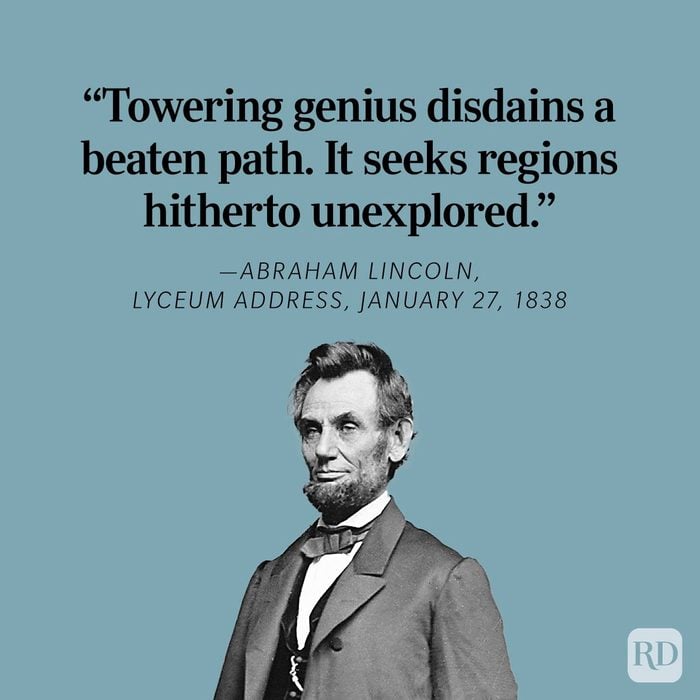
Abraham Lincoln quotes about democracy and freedom
58. “I am naturally anti-slavery. If slavery is not wrong, nothing is wrong. I can not remember when I did not so think, and feel. And yet I have never understood that the Presidency conferred upon me an unrestricted right to act officially upon this judgment and feeling.” —Letter to Albert Hodges, April 4, 1864
59. “Let every American, every lover of liberty, every well wisher to his posterity, swear by the blood of the Revolution, never to violate in the least particular, the laws of the country; and never to tolerate their violation by others.” —Address before the Young Men’s Lyceum of Springfield, January 27, 1838
60. “If slavery is right, it ought to be extended; if not, it ought to be restricted—there is no middle ground.” —Speech at Hartford, March 5, 1860
61. “As I would not be a slave, so I would not be a master. This expresses my idea of democracy.” —Fragment on Democracy, August 1, 1858
62. “In giving freedom to the slave, we assure freedom to the free—honorable alike in what we give, and what we preserve. We shall nobly save, or meanly lose, the last best hope of earth.” —Message to Congress, December 1, 1862
63. “Our government rests in public opinion. Whoever can change public opinion, can change the government, practically just so much.” —Speech at a Republican Banquet, Chicago, Illinois, December 10, 1856
64. “It is rather for us to be here dedicated to the great task remaining before us—that from these honored dead we take increased devotion to that cause for which they gave the last full measure of devotion—that we were highly resolve that these dead shall not have died in vain—that this nation under God, shall have a new birth of freedom—and that government of the people, by the people, for the people, shall not perish from the Earth.” —Gettysburg Address, November 19, 1863
65. “No man is good enough to govern another man, without that other’s consent. I say this is the leading principle–the sheet anchor of American republicanism.” —Speech at Peoria, October 16, 1854
66. “A house divided against itself cannot stand. I believe this government cannot endure permanently half-slave and half-free. I do not expect the Union to be dissolved—I do not expect the house to fall—but I do expect it will cease to be divided. It will become all one thing or all the other.” —House Divided speech, 1858
67. “This country, with its institutions, belongs to the people who inhabit it. Whenever they shall grow weary of the existing government, they can exercise their constitutional right of amending it, or their revolutionary right to dismember it or overthrow it.” —Lincoln’s First Inaugural Address, March 4, 1861
68. “Public sentiment is everything. With public sentiment, nothing can fail; without it nothing can succeed.” —Debate at Ottawa, August 21, 1858
69. “The ballot is stronger than the bullet.” —Quoted during Lincoln’s presidency, 1861–1865
70. “There is more involved in this contest than is realized by eery one. There is involved in this struggle the question whether your children and my children shall enjoy the privileges we have enjoyed.” —Speech to the 164th Ohio Regiment, August 18, 1864
71. “The Autocrat of all the Russias will resign his crown, and proclaim his subjects free republicans sooner than will our American masters voluntarily give up their slaves.” —Letter to George Robertson, August 15, 1855
72. “Towering genius disdains a beaten path. It seeks regions hitherto unexplored.” —Lyceum Address, January 27, 1838
73. “The legitimate object of government is ‘to do for the people what needs to be done, but which they can not, by individual effort, do at all, or do so well, for themselves.’” —Fragment on Government, July 1, 1854
74. “Understanding the spirit of our institutions to aim at the elevation of men, I am opposed to whatever tends to degrade them.” —Letter to Dr. Theodore Canisius, May 17, 1859
75. “It is not merely for to-day, but for all time to come that we should perpetuate for our children’s children this great and free government, which we have enjoyed all our lives.” —Speech to the One Hundred Sixty-Sixth Ohio Regiment, August 22, 1864
76. “Will springs from the two elements of moral sense and self-interest.” —Speech at Springfield, Illinois, June 26, 1857
77. “Let no young man choosing the law for a calling for a moment yield to the popular belief—resolve to be honest at all events; and if in your own judgment you cannot be an honest lawyer, resolve to be honest without being a lawyer.” —Notes for a Law Lecture, July 1, 1850
78. “You dislike the emancipation proclamation; and, perhaps, would have it retracted. You say it is unconstitutional—I think differently.” —Letter to James Conkling, August 26, 1863
79. “Let us neither express nor cherish any hard feelings toward any citizen who by his vote has differed with us. Let us at all times remember that all American citizens are brothers of a common country, and should dwell together in the bonds of fraternal feeling.” —Remarks at Springfield, November 20, 1860
80. “I have never had a feeling politically that did not spring from the sentiments embodied in the Declaration of Independence.” —Speech at Philadelphia, February 22, 1861
81. “The world has never had a good definition of the word liberty, and the American people, just now, are much in want of one. We all declare for liberty; but in using the same word we do not all mean the same thing.” —Address at Sanitary Fair, Baltimore, Maryland, April 18, 1864
82. “In leaving the people’s business in their own hands, we cannot be wrong.” —Speech in the House of Representatives, July 27, 1848
83. “Discourage litigation. Persuade your neighbors to compromise whenever you can. Point out to them how the nominal winner is often a real loser—in fees, expenses and waste of time. As a peacemaker the lawyer has a superior opportunity of being a good man. There will still be business enough.” —Abraham Lincoln’s notes for a law lecture, July 1, 1850
84. “Any people anywhere, being inclined and having the power, have the right to rise up, and shake off the existing government, and form a new one that suits them better. This is a most valuable—a most sacred right—a right, which we hope and believe, is to liberate the world.” —Speech on the War with Mexico, January 12, 1848
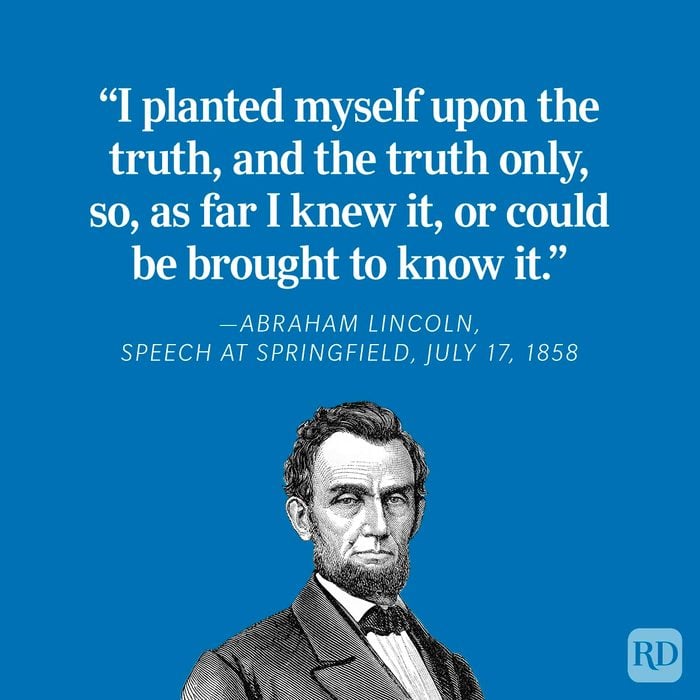
Abraham Lincoln quotes about leadership
85. “Determine that the thing can and shall be done, and then we shall find the way.” —Speech in the House of Representatives, June 20, 1848
86. “I have said nothing but I am willing to live by, and, in the pleasure of Almighty God, die by.” —Speech at Philadelphia, February 22, 1861
87. “The way for a young man to rise, is to improve himself every way he can, never suspecting that any body wishes to hinder him.” —Letter to William H. Herndon, July 10, 1848
88. “This is essentially a People’s contest. On the side of the Union, it is a struggle for maintaining in the world, that form, and substance of government, whose leading object is, to elevate the condition of men—to lift artificial weights from all shoulders—to clear the paths of laudable pursuit for all—to afford all, an unfettered start, and a fair chance, in the race of life.” —Message to Congress, July 4, 1861
89. “A capacity, and taste, for reading, gives access to whatever has already been discovered by others. It is the key, or one of the keys, to the already solved problems. And not only so. It gives a relish, and facility, for successfully pursuing the [yet] unsolved ones.” —Address before the Wisconsin State Agricultural Society, 1859
90. “The struggle of today, is not altogether for today—it is for a vast future also.” —Annual Message to Congress, December 3, 1861
91. “I am rather inclined to silence, and whether that be wise or not, it is at least more unusual nowadays to find a man who can hold his tongue than to find one who cannot.” —Speech at Pittsburgh, February 14, 1861
92. “Every man is proud of what he does well; and no man is proud of what he does not do well. With the former, his heart is in his work; and he will do twice as much of it with less fatigue. The latter performs a little imperfectly, looks at it in disgust, turns from it, and imagines himself exceedingly tired. The little he has done, comes to nothing, for want of finishing.” —Address before the Wisconsin State Agricultural Society, 1859
93. “I made a point of honor and conscience in all things to stick to my word, especially if others had been induced to act upon it.” —Letter to Eliza Browning, April 1, 1838
94. “The true rule, in determining to embrace, or reject any thing, is not whether it have any evil in it; but whether it have more of evil, than of good. There are few things wholly evil, or wholly good. Almost every thing, especially of governmental policy, is an inseparable compound of the two; so that our best judgment of the preponderance between them is continually demanded.” —Speech in the House of Representatives, June 20, 1848
95. “I have not permitted myself, gentlemen, to conclude that I am the best man in the country; but I am reminded, in this connection, of a story of an old Dutch farmer who remarked to a companion once that ‘it was not best to swap horses while crossing streams.'” —Letter to Union Delegation, June 9, 1864
96. “I am not ashamed to confess that twenty-five years ago I was a hired laborer, mauling rails, at work on a flatboat—just what might happen to any poor man’s son. I want every man to have a chance.” —Speech at New Haven, March 6, 1860
97. “I planted myself upon the truth, and the truth only, so, as far I knew it, or could be brought to know it.” —Speech at Springfield, July 17, 1858
98. “Broken eggs cannot be mended; but Louisiana has nothing to do now but take her place in the Union as it was, barring the already broken eggs.” —Letter to August Belmont, July 31, 1862
99. “While we must, by all available means, prevent the overthrow of the government, we should avoid planting and cultivating too many thorns in the bosom of society.” —Letter to Edwin M. Stanton, March 18, 1864
100. “In law it is a good policy never to plead what you need not, lest you oblige yourself to prove what you cannot.” —Letter to former Illinois Attorney General Usher F. Linder, February 20, 1848